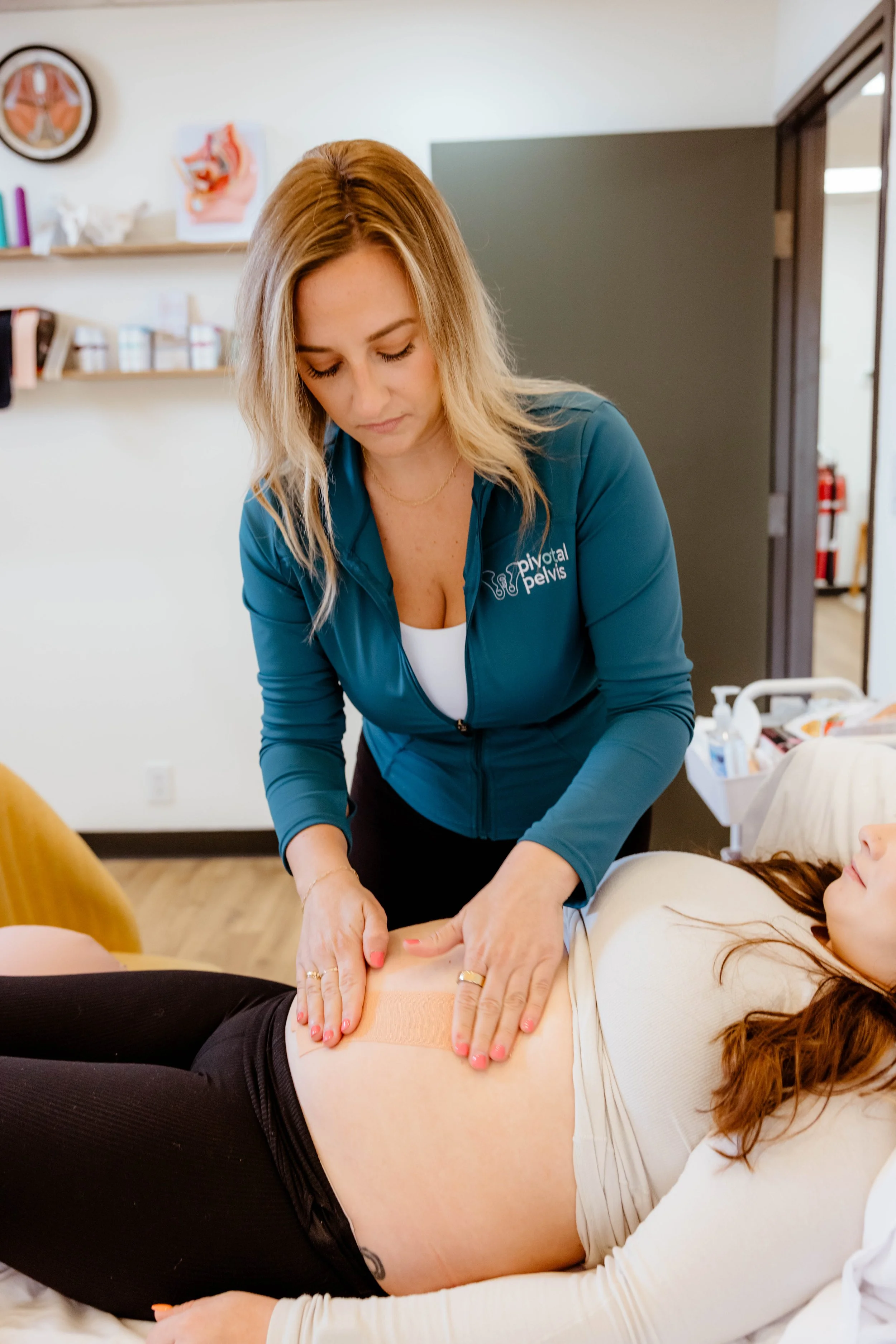Women’s Pelvic Floor
Occupational Therapy Services
At Pivotal Pelvis, we are devoted to women's pelvic health, offering a comprehensive occupational therapy program tailored for those experiencing conditions like endometriosis, PCOS, pregnancy-related changes, and postpartum recovery.
Cassidy is expertly trained in female pelvic floor therapy, addressing a range of issues from chronic pelvic pain to pelvic floor dysfunction during and after pregnancy. Our approach combines education, manual therapy, and targeted pelvic floor exercises, specifically designed for women.
We are committed to alleviating discomfort, enhancing wellness, and supporting women through every stage of their pelvic health journey.
During pregnancy, we focus on strengthening and preparing the pelvic floor and related muscles, aiming to enhance comfort, reduce potential complications, and facilitate smoother postpartum recovery. Let us support you in maintaining a strong, healthy pelvic foundation during this pivotal phase of life.
-
⊛ Gestational Lower Back Pain: Pain in the lower back area during pregnancy due to posture changes and weight gain.
⊛ Pelvic Girdle Pain (PGP): Discomfort in the pelvic region, often due to the relaxation of ligaments and joint instability during pregnancy.
⊛ Diastasis Recti: Separation of the abdominal muscles, common during and following pregnancy.
⊛ Urinary Incontinence: Increased frequency of involuntary urine leakage, often experienced during pregnancy due to pressure on the bladder.
⊛ Sciatica: Pain along the sciatic nerve path, often triggered by pregnancy-related pressure or posture changes.
⊛ Prenatal Pelvic Floor Weakness: Weakening of pelvic floor muscles during pregnancy, potentially affecting bladder control and labor.
⊛ Symphysis Pubis Dysfunction (SPD): Pain in the front center of the pelvis due to the relaxation of the pelvic joints in pregnancy.
Focusing on your unique needs as a new mother, we provide personalized care and effective strategies to ease discomfort and enhance pelvic well-being. Let us support your journey towards a healthier, more comfortable postpartum experience. Embrace motherhood with confidence and improved quality of life. #pivotyourhealth for your postpartum wellness.
-
⊛ Diastasis Recti: Separation of abdominal muscles common after childbirth.
⊛ Urinary Incontinence: Difficulty controlling bladder, especially when coughing, sneezing, or exercising.
⊛ Pelvic Organ Prolapse: Feeling of heaviness or bulging in the pelvic area due to weakened pelvic muscles.
⊛ Pelvic Girdle Pain (PGP): Pain in the pelvic region, including the hips and lower back.
⊛ Perineal Pain: Discomfort in the perineum area, especially after a vaginal delivery.
⊛ Sexual Dysfunction: Pain during intercourse or reduced sexual sensation post-delivery.
⊛ Constipation and Bowel Issues: Difficulty with bowel movements or control.
⊛ Postpartum Depression and Anxiety: Emotional and psychological challenges including mood swings, anxiety, and depression.
⊛ Fatigue and Body Aches: General tiredness and muscle aches from the physical demands of childbirth and childcare.
⊛ Scarring from C-section or Episiotomy: Discomfort or mobility issues from scar tissue.
Our focused Pelvic Health Assessments are tailored to identify and address your unique challenges. We're dedicated to providing personalized care and effective treatment strategies, aimed at reducing discomfort and enhancing your pelvic well-being. Let us help you navigate your journey towards relief and improved quality of life.
-
⊛ Dyspareunia: Painful sexual intercourse.
⊛ Endometriosis: A condition where tissue similar to the lining inside the uterus grows outside the uterus, causing pain and potential fertility issues.
⊛ Interstitial Cystitis/Bladder Pain Syndrome: A chronic condition causing bladder pressure, bladder pain, and sometimes pelvic pain.
⊛ Pelvic Floor Dysfunction: Involves a group of disorders that result from an inability to correctly relax and coordinate pelvic floor muscles.
⊛ Vulvodynia: Chronic pain or discomfort around the opening of the vagina, with no identifiable cause.
⊛Irritable Bowel Syndrome (IBS): A common disorder affecting the large intestine, causing cramping, abdominal pain, bloating, gas, diarrhea, and constipation.
⊛ Pelvic Inflammatory Disease (PID): An infection of the female reproductive organs, often caused by sexually transmitted bacteria.
⊛ PCOS (Polycystic Ovary Syndrome): A hormonal disorder causing enlarged ovaries with small cysts on the outer edges.
⊛ Pudendal Neuralgia: A condition involving pain along the course of the pudendal nerve, which runs through the lower pelvis.
Ready To Get Started?
Helping You Pivot Your Pelvic Health,
So You Can Live with Confidence and Comfort!
Want to Get Started? Send me a message!
Call us Today! (707) 200-3577
Fax Number: (707) 324-6775
151 Lynch Creek Way Petaluma, California, 94954
Follow Us!






